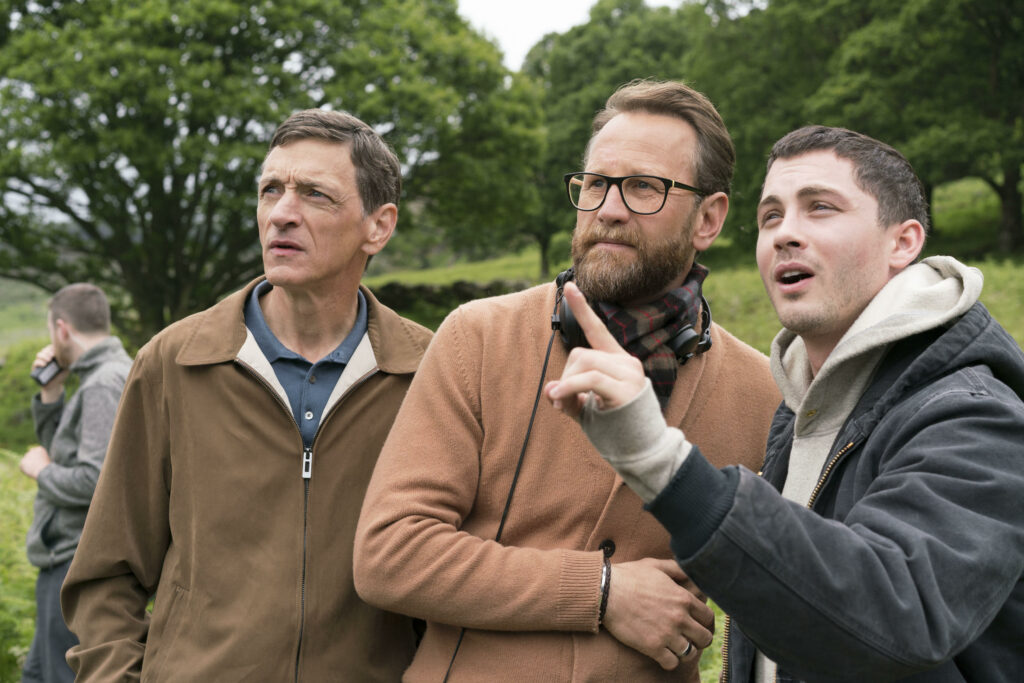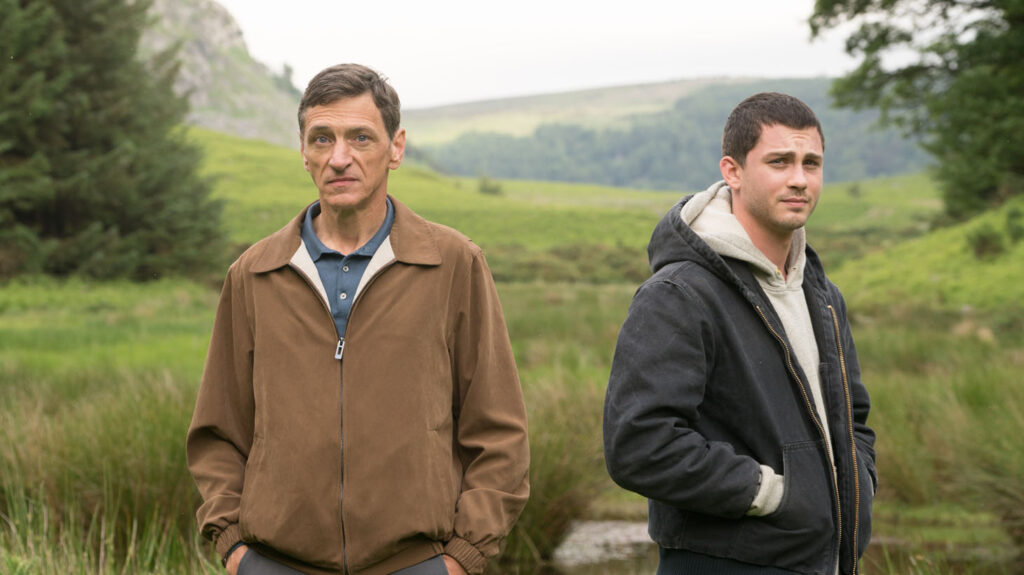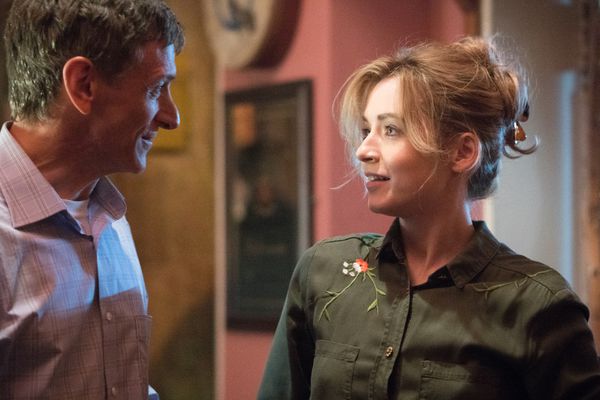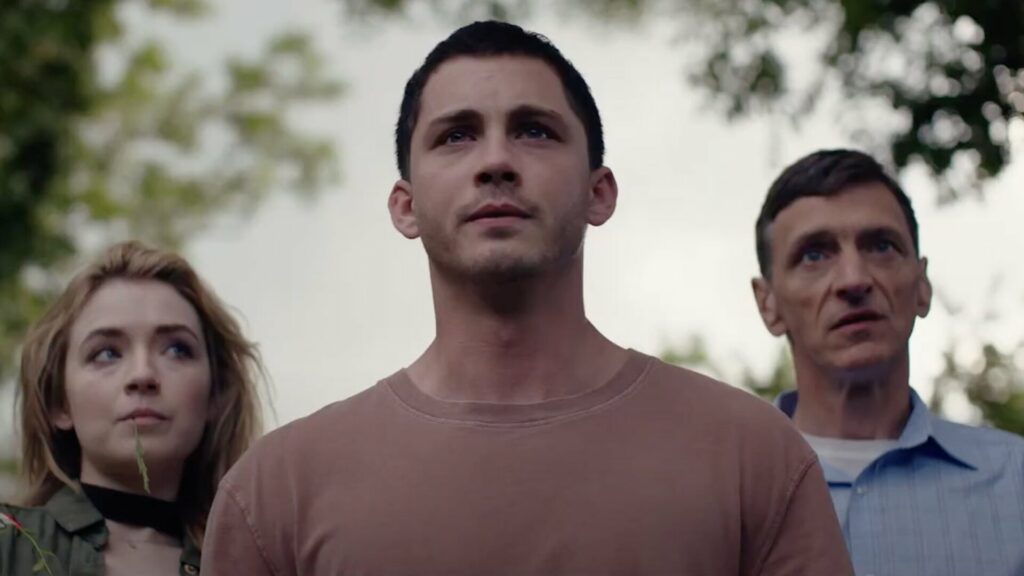End of Sentence is a road trip drama co-starring Logan Lerman (The Perks of Being a Wallflower, Percy Jackson franchise) and John Hawkes (Academy Award nominee for Winter’s Bone, Peanut Butter Falcon) as Sean and Frank Fogle, respectively. After being released from prison, Sean reluctantly embarks on a journey with his estranged father to spread his mother’s ashes in a remote lake in her native Ireland.
Ahead of its world premiere at the Edinburgh International Film Festival in 2019, Outtake spoke with Icelandic filmmaker and director of End of Sentence, Elfar Adalsteins, and star John Hawkes about the making of this heart-warming film.

How did End of Sentence come about?
Elfar Adalsteins: Michael Armbruster wrote the script. I was introduced to him by a mutual friend called Eva Maria Daniels, who is one of the executive producers, and who thought that we would potentially make a good pairing. So we met in Los Angeles and decided to collaborate on the script. And because it was set abroad, we took a road trip to Ireland together, and drove all through the country in this Nissan Micra.
John Hawkes: Nissan Micra is that really big one, right?
Elfar Adalsteins: Totally, huge [laughs]. But we fell in love with the country and we felt very early on that it would fit with our premise. I’ve said before that Ireland has a crooked smile. It’s been through so much, and that suited the story perfectly.
End of Sentence offers such a gorgeous look at Ireland.
John Hawkes: But not a picture postcard!
Elfar Adalsteins: No, that had been done before. We wanted to show it as beautiful, ugly, and everything in between. We wanted it to be real.
And you see that with the contrast between beautiful, picturesque lakes and rolling hills, and the concrete city with political graffiti. Usually with films it’s one or the other.
John Hawkes: That was set dressing, wasn’t it?
Elfar Adalsteins: Some of it, and some of it was real. It was very important to us to show a realistic version of the country. There’s a connection between the struggles of the character and Ireland’s struggle; there’s a transgenerational pain that both stories share.

And John, how did you get involved?
John Hawkes: I won the lottery, just went to the store and filled out a form [laughs]. No, just the boring way where the script shows up at your house and you read it. But not the boring way because my heart was pierced. I just feel like it’s so subjective, but something either grabs us by the lapels and drags us into it, or it doesn’t. And this just hit me. I liked the script a great deal, I liked the character a great deal.
Something about Frank really spoke to me, and then I met Elfar who seemed like a really cool human being… turned out he wasn’t [laughs]. And then I watched his film Sailcloth, and that’s when I knew that I was with someone who could tell a story. And that’s all I needed.
But the story is a big deal to me, and it is to Logan Lerman as well. I think we’re similar in how we approach the idea of acting, which would be to figure out the story as a whole, then figure out how to serve that story. We even spoke with Elfar about ideas we had for the script, like minor shifts that were used or not. We came at it from that angle, and then honed in on our own little parts.
Elfar Adalsteins: And we’ve been talking about the rehearsal process, and I worked on that with Logan. It’s not rehearsals in the sense that you do in the theatre, it’s more preparation time spent looking at the story and asking questions, making sure we understand the goal, the causality of events, and how we’ll get there. And that was a really fulfilling experience because I could feel early on that there was a mutual understanding and emotional connection to the material; I felt that it suited all of us.

John Hawkes: I’ve worked with directors who’ve gotten really great results and who like to really rehearse in the traditional sense. But I’m made nervous by that because invariably, if you’re rehearsing a scene, interesting things will happen – but the cameras won’t be recording. I came up doing theatre for 10 or 15 years before I ever got in front of a camera. In theatre, you find the moments in the play and you reproduce them for the audience each night. But I think the uniqueness of the camera and film is that it can capture human behaviour as it’s happening in that moment, and moments that will never happen again. There’s a weird electricity to that.
I loved how we worked. We’d get together every Sunday, the three of us, and we’d eat and chat for two or three hours. And that saved us a great deal of time because when we got to set, we hadn’t answered the questions, but at least we had asked them.
Elfar Adalsteins: And I think the material at hand dictates what we were doing. End of Sentence is a story about an estranged father and son. So the familiarity you develop from rehearsals wouldn’t have suited the story. You want this dissonance and unfamiliarity to be sustained.
John Hawkes: And you know, we’d go out and have beers, but we weren’t really ever talking much about the movie or roles. We got to know each other, and I think that kind of familiarity and comfort is good, because then the actors trust each other and can deal with a lot of physical and emotional discomfort between characters. You can have a comfortable discomfort.
The road trip subgenre is so great, too. It’s amazing how much character work can be done when you’re confined in a little car.
John Hawkes: Plus, when you throw that in with the ‘Stranger in a Strange Land’ angle, suddenly you’ve got people like Frank and Sean getting confused by plumbing, electricity, all these kinds of things [laughs]. Americans don’t travel well.

That adds another element of discomfort and humour that are key. If you tell a story with some weight to it, you’ve got to find the humour wherever you can. And one of our mandates was to fight sentimentality throughout, as best we could. And for me personally, it was to fight self-pity and instead find unintended types of real humour. I think it helps open people up to take on something a little heavier.
For sure, an oversaturation of sentiment can numb the audience to it, which is the opposite of what you want.
John Hawkes: Exactly. It’s hard to get one over on people. But that’s good because it keeps us searching for the truth.
Elfar Adalsteins: You have to respect the audience and allow them to take whatever it is away from it, and digest it on their own terms. There’s a different ending in the script, but we cut it off because we found a more natural ending for the movie. There was a fair amount after the cut-off. But we wanted the ending to be left open, and we had to let the characters be.
John Hawkes: Our ending wasn’t satisfying. What happens after is up to you.
And finally, as our own post-credits scene, what’s next for the two of you?
John Hawkes: I’m retiring. I’m going to make shoes [laughs].
Elfar Adalsteins: We’re doing a slapstick comedy called Three Guys in a Banana Boat. But seriously, I’m doing an Icelandic film next called Summerlight… and Then Comes the Night. It’s an adaptation I wrote from a beautiful novel by Jon Kalman Stefansson. It narrates the stories of the people that live in a little seaside village in Iceland, the trials and tribulations of those living at the edge of the world.
John Hawkes: I’m not retiring, but I don’t know what I’m doing. Making music and reading books. I like to be lazy by nature. There’s a proverb that goes “how wonderful it is to do nothing and then to rest”. I live like that.
End of Sentence is out on Digital now.
This interview originally took place in June 2019, when End of Sentence had its world premiere at Edinburgh International Film Festival.
